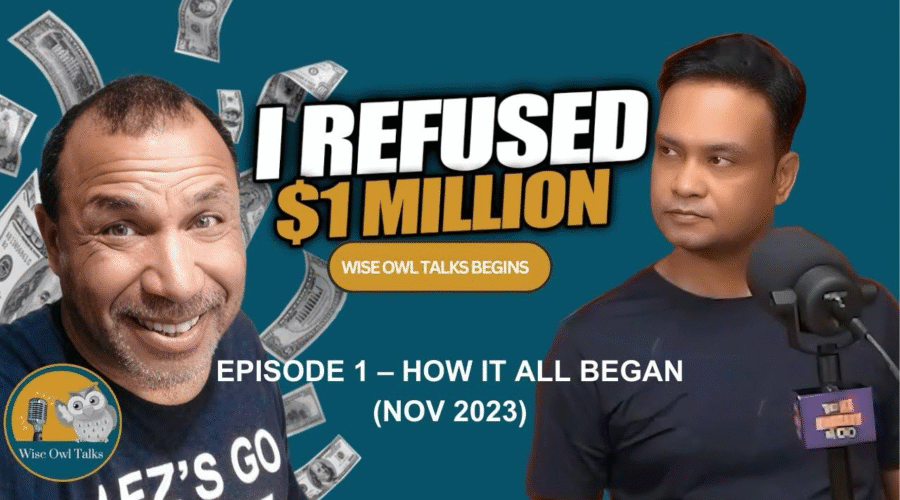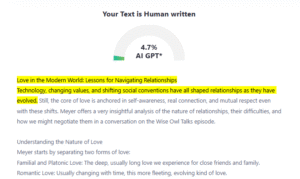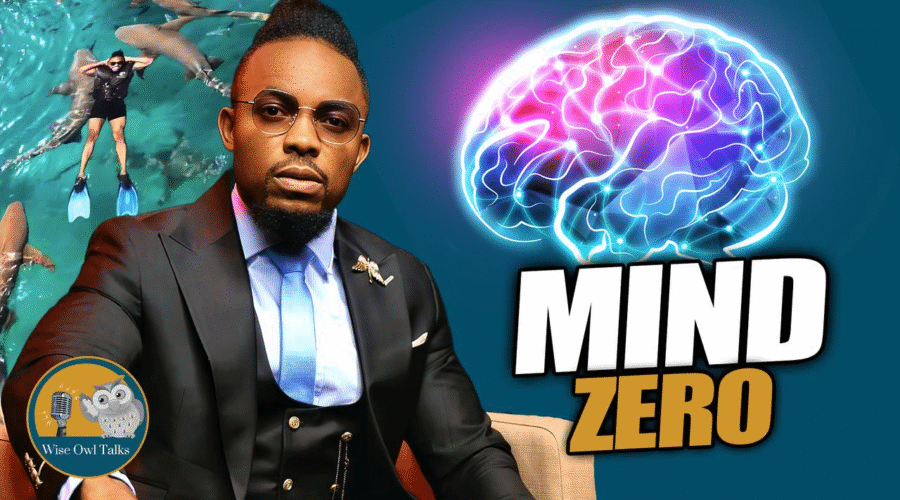Dreams, Gratitude, and the Pursuit of Happiness: A Real Conversation About Life
Many people think that success, wealth, or worldly goods bring one happiness. Social media presents well-chosen lives that make us feel as though we are deprived. Is happiness, then, really about wealth, status, or possessions? Alternatively is it something more, an inner condition of mind molded by dreams and thanks?
Wise Owl Talks started with the wisdom of its first episode, featuring Meyer, who has visited 154 countries and shared his profound insights on happiness, dreams, and gratitude. Let us delve into his observations and discover what truly makes one happy.
Would You Take a Million Dollars?
Imagine being given a million dollars with one restriction—you only have five days to live. Would you pick up the money? Most people would say no. This straightforward inquiry exposes a crucial reality: although it cannot ensure happiness, money can help to solve problems. Although financial stability brings comfort, it is not the basis of long-lasting delight.
Happiness: A Choice, Not a Destination
Meyer underlines that every day we make decisions about our happiness. Though we sometimes find delight in worldly objects—a new car, a lovely house, or a dream trip—these only provide momentary gratification. Real happiness is about enjoying the process rather than merely the result.
Consider someone picking up the ukulele playing. They do not find satisfaction just when they reach mastery. Rather, they celebrate every little success along the road—learning a new chord, performing a song, and distributing their work to friends. In the same vein, happiness results from valuing advancement rather than merely attaining the end result.
The Problem with Social Media
Social media generates a false reality. People post just their best moments—luxurious trips, contented relationships, and noteworthy successes. This causes us to evaluate our life against a well-chosen version of someone else’s, which breeds discontent.
We have to turn inside ourselves if we are to be really happy. We should find what actually makes us happy rather than looking to social media for approval. It could be simply enjoying the small pleasures in life, following a passion, or spending time with loved ones.
Dreams: More Than Just Wishes
Though they need work, dreams provide direction. Meyer says that realizing a dream is about acting practically rather than only wishing.
For instance, someone who wants to dance has to promise daily practice. Their dancing will not improve overnight. Rather, they have to divide the process into reasonable steps, such as daily 24-minute practice sessions spanning 60 days.
This holds true for any objective, from learning a language to launching a company to world travel. Dreams come true only when we act consistently toward them.
Gratitude: The Key to Lasting Happiness
Happy living is much influenced by gratitude. Meyer tells me his happiness begins the moment he wakes up. He values basic amenities including fresh water, a roof over his head, and the opportunity to pick knowledge. Many people forget to value what they already have even as they pursue great dreams.
Gratitude does not mean sacrificing objectives. Rather, it means savoring the trip as one works toward them. It keeps us anchored and helps us avoid frustration when events deviate from expectations.
Does Money Make You Happy?
Many people think they would be happy with more money. Though it can bring comfort, money cannot ensure fulfillment. Rich people too suffer with discontent.
Money fixes financial difficulties; happiness is an internal mental state. Rather than depending on outside events, we should concentrate on developing meaningful relationships, personal development, and thankfulness.
The Balance Between Dreams and Gratitude
Some would wonder: will we stop dreaming if we are overly thankful? That is not the response. Dreams and thankfulness cooperate. While dreams propel us ahead, thankfulness helps us to be happy right now.
Imagine someone hoping to see Paris. They should value the trip rather than become annoyed about not yet being there. Every action, whether they budget for a ticket or schedule their trip, shapes the experience. The process becomes fun when one is grateful.
Conclusion
Contentment has nothing to do with riches, social standing, or realizing every fantasy. It comes from a viewpoint. It results from choosing deliberately, valuing little events, and realizing that the trip counts equally with the destination.
We should concentrate on what actually makes us happy instead of running after outside gratification. Happiness is within our reach whether our goals are personal enjoyment of the present, development of relationships, or following a passion. We can design a meaningful and happy life by juggling dreams with thankfulness.
Personally speaking, after this podcast—an initial conversation recorded through my phone—I, Palash, was inspired to start the Wise Owl Talks Podcast in Malaysia.
🦉 Listen to the full episode of Wise Owl Talks: Dreams, Gratitude, and the Pursuit of Happiness
🎧 Tune in now: Wise Owl Talks Episode Link



























